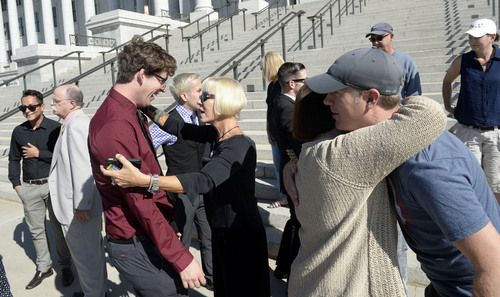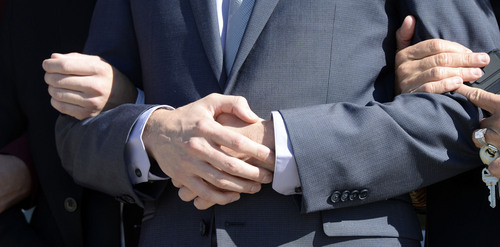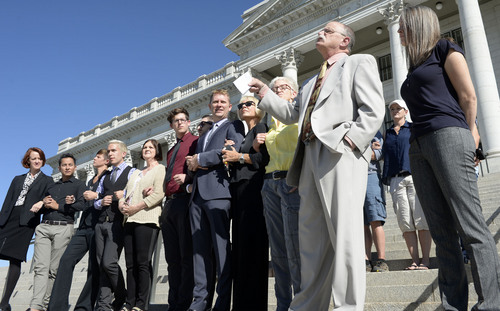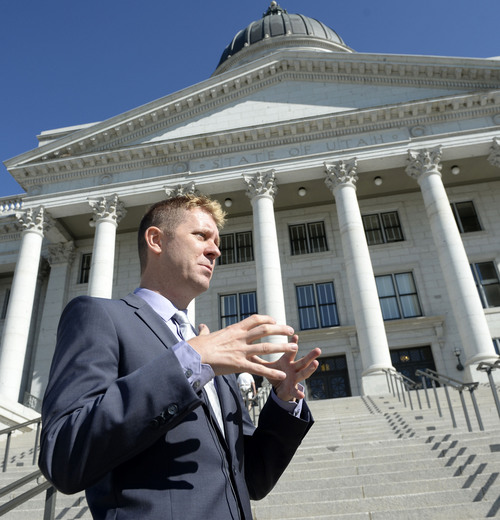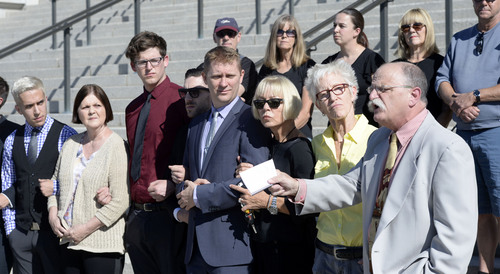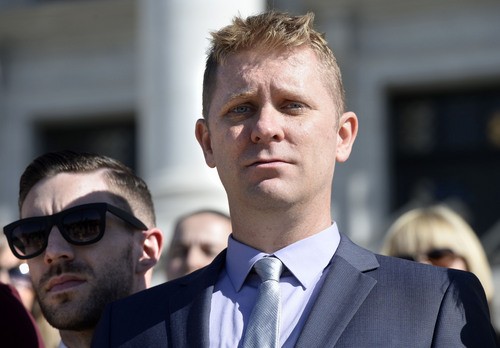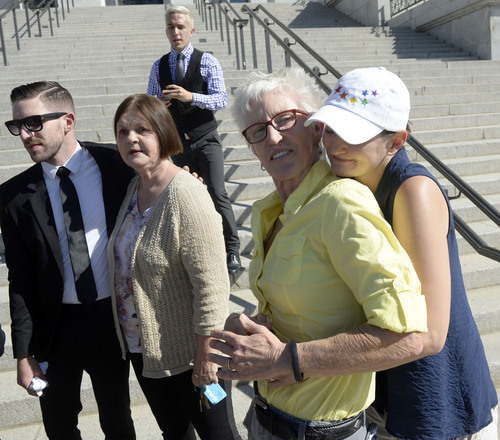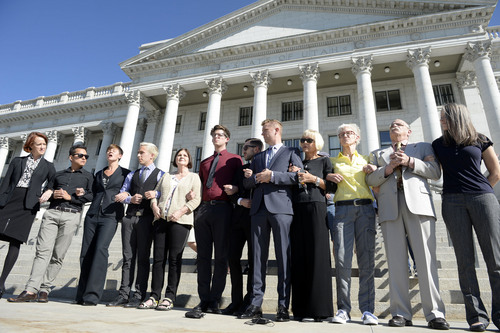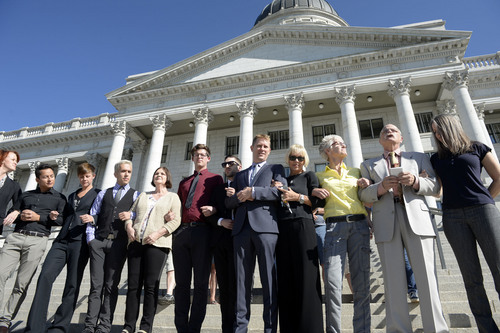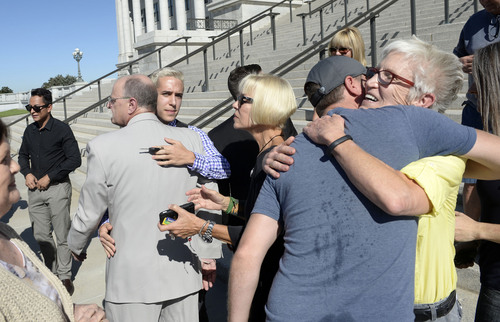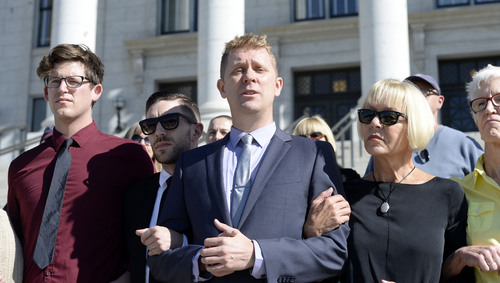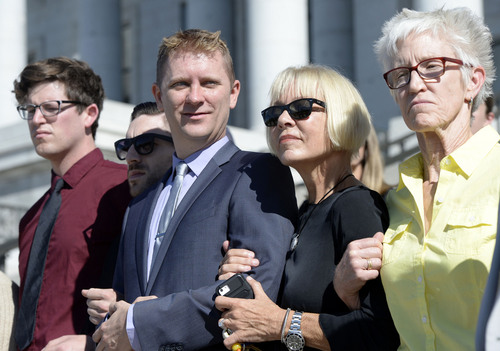This is an archived article that was published on sltrib.com in 2014, and information in the article may be outdated. It is provided only for personal research purposes and may not be reprinted.
The last time this group stood arm in arm at the Capitol, demanding to be heard, they were hauled away in handcuffs.
Thirteen protesters, who were charged Wednesday with disturbing a legislative meeting as they rallied to support a bill outlawing discrimination against gay people six months ago, gathered together once more to announce their intent to fight the charges against them and make their voices heard — even if it's in a court of law, rather than the Utah Legislature.
"We were shut out of the democratic process; our community was shut out of the democratic process," gay-rights activist Troy Williams, 44, said Thursday. "So we came to the Capitol to follow the proud tradition of American civil disobedience and we locked arms together — gays, lesbians, straight allies, and we had our fair share of active Latter-day Saints — and we refused to move."
The men and women who call themselves the Capitol 13 were each charged with one count of disrupting a meeting, a class B misdemeanor punishable by up to six months in jail.
They have all been ordered to appear in the Salt Lake City Justice Court on Sept. 26 for an arraignment, at which they will all plead not guilty.
"I'm anxious to go to court," said Gail Turpin, 69, a self-described straight ally, whose sister was also arrested.
The protesters, ages 20 to 69, were arrested Feb. 10 as they blocked the entrance to a hearing in hopes of intercepting Utah Senate President Wayne Niederhauser, R-Sandy, and demanding a vote on SB100.
The bill died in a closed-door meeting where Senate Republicans voted not to consider the anti-discrimination measure, which would have outlawed employment and housing discrimination against gay, lesbian, bisexual and transgender people.
On Thursday, several of the 13 acknowledged they were prepared to be arrested on that day in February.
"I was willing to accept the consequences of my actions, whatever that meant. We didn't know if we would be arrested or charged with a felony or have to serve jail time, but we wanted the bill to be heard — no matter what it took," defendant Kevin Garner, 31, said in an interview. "Our community has suffered enough. Being arrested and charged? That's nothing compared to losing your job and your family's livelihood, or getting kicked out of where you live because you're an LGBT person."
Lawmakers said at the time that lawyers advised them to kill the bill, fearing that any debate could reveal "animus," or ill will, against LGBT people that could fuel the case against Utah's same-sex marriage ban, which was struck down in December by U.S. District Judge Robert J. Shelby.
The lawsuit aimed at toppling Utah's voter-approved ban on same-sex marriage has succeeded at both the district court and the federal appeals court. In its last effort to revive Amendment 3, the state has appealed to the U.S. Supreme Court, asking the nation's nine justices to determine whether states have the right to define marriage as they see fit or whether marriage is a fundamental right guaranteed to all Americans, regardless of the gender makeup of couples.
"It's an excuse," lawyer Dani Hawkes said of the Kitchen v. Utah lawsuit. "This bill had nothing to do with that case."
The SB 100 anti-discrimination bill is not the first of its kind. Similar measures have been defeated for each of the past five years.
"The lowest common denominator in this case is the state of Utah will listen to pretty much anybody that supports them and gives them money for re-election. They will listen to anybody who is part of their base," said attorney Ron Yengich. "There is only one community in Utah they will not and have not listened to, and that's these folks."
Attorneys for the demonstrators, who stood arm in arm with their clients atop the Capitol steps Thursday, said they intend to take these cases before a jury, where they will argue that the Utah Constitution guarantees and protects the "inherent and inalienable right" to "assemble peaceably, protest against wrongs and petition for redress of grievances" — a protection which, the lawyers said, supersedes any disruption of meeting statute.
"Here's the problem in Utah: These folks don't have a voice here; they don't hear them here because they don't see or speak or feel what they want them to see or speak or feel," Yengich said, pointing to the dome of the Utah Legislature rising behind him. "The tragedy of that is this state was formed by people who didn't have a voice."
Salt Lake City spokesman Art Raymond said the charges took about six months to file due to the volume of a case involving 13 defendants. He also dismissed any criticism that the charges were politically motivated.
"I can certainly say, unequivocally, that politics play absolutely no role in the work done by our prosecutors office," Raymond said.
The names of the 13 protesters: Matthew Anderson Conway, 26; Kevin Scott Garner, 31; Steven Randall Germann, 22; Jacob Joseph Hanson, 27; Angela Jo Isaacs, 34; Matthew James Landis, 44; Orlando Luna, 20; Gail Ellen Murdock, 61; Justin James Trent, 24; Michelle Turpin, 51; Gail Mildred Turpin, 69; Troy Williams, 44; and Donna Gonzalez Weinholtz, 59.
Twitter: @Marissa_Jae


